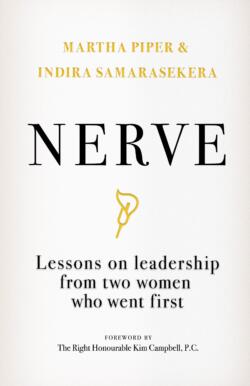1818 The world of leadership
Nerve: Lessons on Leadership from Two Women Who Went First
by Martha Piper and Indira Samarasekera, with a foreword by Kim Campbell
Toronto: ECW Press, 2022
$36.95 / 9781770416017
Reviewed by Amy Tucker
*
 In a world where the glass ceiling is still very much present, Nerve: Lessons on Leadership from Two Women Who Went First is a refreshing, empowering, and inspiring read. The first female presidents of two of Canada’s most prominent research universities, Martha Piper and Indira Samarasekera, co-wrote this book, detailing their experiences and how they rose to the top. It offers invaluable guidance for leaders of any age, particularly women in male-dominated industries.
In a world where the glass ceiling is still very much present, Nerve: Lessons on Leadership from Two Women Who Went First is a refreshing, empowering, and inspiring read. The first female presidents of two of Canada’s most prominent research universities, Martha Piper and Indira Samarasekera, co-wrote this book, detailing their experiences and how they rose to the top. It offers invaluable guidance for leaders of any age, particularly women in male-dominated industries.
The authors authentically open up throughout the book, sharing their personal and professional stories with raw honesty and vulnerability. These real-life anecdotes resonate with readers, offering relatable and valuable lessons for those navigating academia and leadership. Piper and Samarasekera’s mission is to inspire and empower more women to rise to the challenge and take on leadership roles by sharing their unique insights on the obstacles and opportunities women encounter in such positions.
The authors also argue that a girl’s relationships with her parents, siblings, and grandparents can significantly influence the development of her leadership skills rather than simply her birth order (e.g., being the firstborn or an only child). The following quote highlights how an individual’s life experiences, upbringing, and the impact of family and other essential figures often play a critical role in shaping their leadership qualities:
More often, leaders are forged by their experience, upbringing, elders, and other life influences. A girl’s family and her relationship with her parents, siblings, and grandparents may play a more important role in cultivating leadership skills than whether she was first- or only-born. Similarly, the development of nerves may occur as a result of having had to deal with adversity sometime in your life .

The quote also highlights the importance of facing adversity in one’s life, as overcoming challenges helps develop resilience and mental fortitude, referred to as “nerves” in this context. These qualities are crucial for effective leadership. The quote stresses that leadership results from one’s life experiences, personal relationships, and ability to confront adversity rather than being a predetermined trait based solely on birth order.
One of the most compelling parts of Nerve is the authentic manner in which the authors open up about their life stories and experiences. They are open to discussing their challenges as women in academia and other male-dominated fields. They do not downplay their insecurities or doubts. Instead, they candidly share their obstacles and their journey to overcome them, offering priceless wisdom for other women navigating similar situations. The book thoughtfully integrates current research on leadership and women’s roles, adding depth and context to the authors’ narratives. This mixture of real-life experiences and research findings creates a vivid and comprehensive portrayal of the distinct challenges and opportunities that women come across in leadership positions.

Piper and Samarasekera faced gender bias and stereotypes throughout their careers, which often limited their opportunities or influenced how others perceived their abilities. They had to confront these biases and work to break through the stereotypes. As women in leadership positions, both authors had to navigate the delicate balance between their professional and personal lives. They discuss the importance of finding support systems, setting boundaries, and making tough decisions to maintain this balance. Both authors recount instances where they grappled with self-doubt and imposter syndrome. They discuss the importance of acknowledging these feelings, building self-confidence, and seeking feedback from trusted colleagues to overcome such challenges. The authors emphasize the importance of taking calculated risks and being open to new opportunities, even when they seem daunting or unfamiliar. They discuss how their willingness to embrace new challenges contributed to their career success.
However, some readers may find Nerve lacking in immediate calls to action. While the book is rich in high-level insights, wisdom, and lessons learned, it offers readers few specific recommendations or concrete advice. This may leave some yearning for more actionable guidance. Despite this, Nerve is essential for anyone interested in leadership, particularly women in academia and other male-dominated fields. The unique perspectives and experiences shared by the authors make this book an invaluable resource for understanding and navigating the world of leadership.
My biggest takeaways from this book are the importance of being courageous, taking risks, and taking on leadership opportunities. The book also highlights how crucial having mentors, coaches, and sponsors in our lives is. The authors also recommend staying strong and determined when we face adversity. The authors believe more women should rise to the occasion and take on more leadership roles. Their conviction is a powerful call to action, encouraging us to tap into our potential and make a meaningful impact. I highly recommend Nerve: Lessons on Leadership from Two Women Who Went First. The book provides a glimpse into a world of leadership into which only a few women have ventured.
*

Amy Tucker is an instructor at Thompson Rivers University with a diverse educational background, including expertise in leadership, organizational behaviour, sustainability and ethics, and human resource management. In her spare time, she loves to read and enjoy adventures in her travel van, lovingly named “Vanish.”
*
The British Columbia Review
Interim Editors, 2023-24: Trevor Marc Hughes (non-fiction), Brett Josef Grubisic (fiction)
Publisher: Richard Mackie
Formerly The Ormsby Review, The British Columbia Review is an on-line book review and journal service for BC writers and readers. The Advisory Board now consists of Jean Barman, Wade Davis, Robin Fisher, Barry Gough, Hugh Johnston, Kathy Mezei, Patricia Roy, Maria Tippett, and Graeme Wynn. Provincial Government Patron (since September 2018): Creative BC. Honorary Patron: Yosef Wosk. Scholarly Patron: SFU Graduate Liberal Studies. The British Columbia Review was founded in 2016 by Richard Mackie and Alan Twigg.
“Only connect.” – E.M. Forster
4 comments on “1818 The world of leadership”